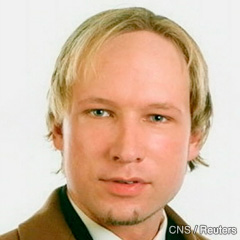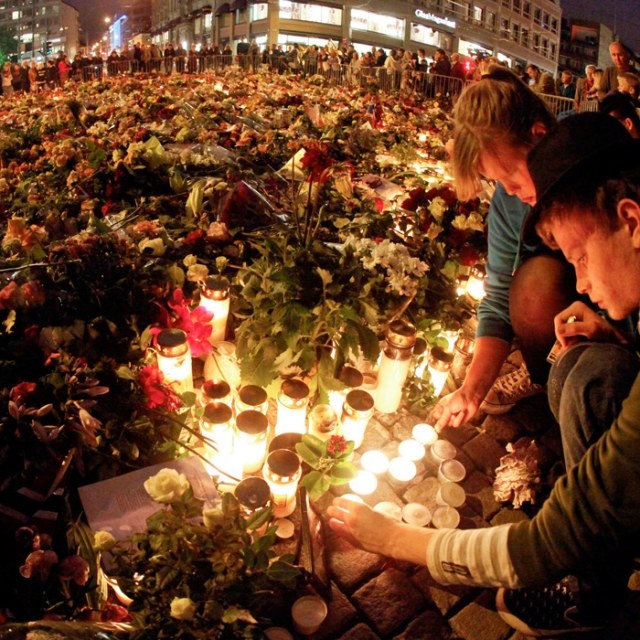After confessing to the shooting massacre of youths at an island retreat and the bombing in Oslo, the Norwegian capital, which together took 76 lives, Breivik in an initial court hearing July 25 pleaded not guilty to terrorism charges. He said he was acting to save Europe from what he described as "Muslim colonization."
Terror activities associated with the neo-pagan subculture "has been going on in Norway for 20 years," Podoshen said, largely in the form of church burnings. The neo-pagans' assertion was that "the churches were deliberately built on pagan holy sites, they (church builders) had put a cross on top of the pagan holy site," which then warranted its destruction, he added.
"Their version of Christianity is a lot different than everybody else's definition of Christianity," according to Podoshen. "It's not the type of Christianity that you and I are going to be accustomed to. This is Christianity that has been twisted for their purposes."
These groups also hate American imperialism as they define it, but "they certainly hate Islam more than anything else," Podoshen said.
Podoshen said he stumbled onto Norwegian hate groups from his love of heavy-metal rock music. Norway's brand of heavy metal is often referred to as "death metal" or "black metal," with soundscapes on disc that made the listener feel it was "the end of the world," he said.
Many of the performers, and some of their fans, subscribed to the neo-pagan thinking.
"They just did not like the modern Norwegian way of life," Podoshen said. For them, he added, "McDonald's is American imperialism. For them, 'building the new' is actually going back to the old." "The scary thing is that Anders Breivik was influenced by anti-Muslim ideologues in the United States," said Heidi Beirich, research director at the Southern Poverty Law Centre in Montgomery, Ala., which tracks hate groups of all stripes operating in the United States.
"The scary thing is that Anders Breivik was influenced by anti-Muslim ideologues in the United States," said Heidi Beirich, research director at the Southern Poverty Law Centre in Montgomery, Ala., which tracks hate groups of all stripes operating in the United States.
Breivik's 1,500-page manifesto was peppered with items pulled from several U.S. blogs, including those of Robert Spencer and Pamela Geller.
"We list their web sites as hate sites because of their Muslim-bashing," Beirich said. It's not that the bloggers intend to incite violence, she added, but when bloggers repeatedly say "'Muslims are coming here to destroy our country, Muslims are coming here to destroy our culture, Muslims are inspired by an ideology to kill you,' someone makes them out to be the enemy — and then they want to take the enemy out."
Similar organizations monitor hate groups that exist throughout Europe, Beirich told CNS. The problem takes on a different dimension in Europe as anti-immigrant political parties have sprung up and captured a significant minority of the vote in elections, she said.
Randall Rogan, a professor of communication at Wake Forest University who over the past eight years has examined the language and discourse of terrorism, said that while Breivik "does his best to distance himself from neo-Nazism due to the political correctness of the issue ... he seems to be coming from that school of thought, which is pro-nationalism or pan-European Christian identify, but the entire anti-Marxist, anti-cultural imperialism, anti-jihadism thing."
Norway was "very, very low" on terrorism observers' watch lists, Rogan said, "because of the nature, the culture, the peace-loving tolerance, the elements characteristic of Norway ... simply because it's the location of the Nobel Prize."
Beirich is worried about copycats, noting the sharp rise in anti-Muslim sentiment from the controversy last year over the Park 51 project, an Islamic cultural centre that became known in shorthand as the "ground zero mosque."
"We're very fearful about what the 9/11 anniversary is going to bring," Beirich said. "We don't want an Anders Breivik situation here as well."
Norway shooter is against Christian, Jewish faiths as well
By Mark Pattison, Catholic News ServiceWASHINGTON - The man responsible for the July 22 Norway terror attacks, Anders Behring Breivik, is not only against Muslims but also anti-Jewish and anti-Christian, according to a longtime observer of Norwegian hate groups.
Breivik is at least philosophically allied with a loosely organized underground subculture of Norwegians who consider themselves "Odinists and neo-pagans," said Jeffrey Podoshen, an associate professor of marketing at Franklin & Marshall College, a liberal arts school in Lancaster, Pa. He teaches classes in business, organizations and society, and Judaic studies.
Odin is an ancient Norse god sometimes better known these days as the father of another Norse god, Thor, but in Norse mythology is associated with war, battle, victory, death, wisdom, magic, poetry, prophecy and the hunt.
This subculture, Podoshen told Catholic News Service, is "looking at Christianity as Breivik looks at Islam."
Please support The Catholic Register
Unlike many media companies, The Catholic Register has never charged readers for access to the news and information on our website. We want to keep our award-winning journalism as widely available as possible. But we need your help.
For more than 125 years, The Register has been a trusted source of faith-based journalism. By making even a small donation you help ensure our future as an important voice in the Catholic Church. If you support the mission of Catholic journalism, please donate today. Thank you.
DONATE
